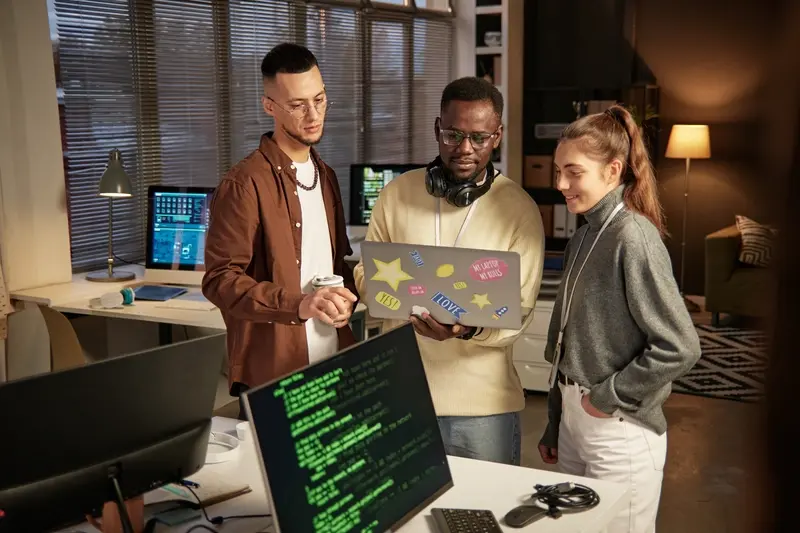Can Anyone Develop An App?
Have you ever had that lightbulb moment where you thought, "I've got a brilliant idea for an app"? You're not alone. In fact, we hear this almost daily from aspiring developers, entrepreneurs, and creative minds who dream of turning their ideas into reality. But then comes that nagging question: "Can I actually build an app myself?"
The short answer might surprise you - yes, practically anyone can develop an app these days. Just like how you don't need to be a professional mechanic to drive a car, you don't necessarily need to be a coding wizard to create an app. What you do need, however, is dedication, the right mindset, and a clear understanding of the journey ahead.
The distance between your app idea and a finished product isn't measured in lines of code - it's measured in determination, learning, and problem-solving.
Think of app development like building a house. You might not know how to lay bricks or install plumbing right now, but with the right tools, guidance, and persistence, you could learn. Some people might choose to do everything themselves, while others might prefer to work with professionals or use pre-built solutions - and that's perfectly fine!
In this comprehensive guide, we'll walk you through everything you need to know about app development, from essential skills and tools to different development approaches. Whether you're a complete beginner or someone with basic programming knowledge, we'll help you understand what's possible and how to get started on your app development journey.
What Does App Development Really Mean?
Remember when you first used a mobile app and thought, "I wish I could make something like this"? Well, you're not alone! App development might seem like a mysterious art, but at its core, it's simply the process of bringing an idea to life on mobile devices.
Think of app development as building a digital house. Just as a house needs architecture, foundations, and interior design, an app requires careful planning, coding, and user interface design. It's a journey that combines creative thinking with technical know-how.
The Main Components of App Development
- Planning and Strategy: Sketching out your app's blueprint
- Design: Creating the look and feel users will love
- Development: Writing the actual code that makes everything work
- Testing: Making sure everything runs smoothly
- Deployment: Getting your app onto app stores
- Maintenance: Keeping things running and up-to-date
Just like baking a cake requires more than just putting ingredients in the oven, app development involves multiple stages and skills. You might excel at design but find coding challenging, or vice versa - and that's perfectly normal! The good news is that modern tools and platforms have made it easier than ever for beginners to start their app development journey.
Whether you're dreaming of creating the next Spotify or just want to build a simple tool to help organise your daily routine, understanding these basics is your first step. And remember, every successful app developer started exactly where you are now - wondering if they could do it!
Essential Skills for App Development
When you're dreaming of creating the next big app, it's natural to wonder if you've got what it takes. Let's be honest - while anyone can learn app development, there are some fundamental skills that will make your journey much smoother.
Technical Foundation
Think of app development like building a house. You'll need a solid foundation in logical thinking and problem-solving - these are your bricks and mortar. Just as you'd learn to use a hammer before building a house, you'll want to get comfortable with basic programming concepts. Don't worry if you're not a maths genius; what's more important is your ability to break down complex problems into smaller, manageable pieces.
Soft Skills That Matter
Here's something that might surprise you: technical skills are only half the story. Some of the most crucial abilities include patience (trust us, you'll need it when debugging), creativity (for designing user-friendly interfaces), and persistence (because your first attempt rarely works perfectly). It's rather like learning to play the guitar - you won't be performing at Wembley Stadium on day one, but with practice and determination, you'll keep improving.
Most importantly, you'll need curiosity and a willingness to learn continuously. The app development world changes faster than British weather, and staying current is part of the journey. Remember, even experienced developers are constantly learning new things - it's what makes this field so exciting!
Before diving into coding, spend time learning about user experience (UX) design principles. Understanding how users think and interact with apps will make your technical learning journey much more meaningful.
Tools and Technologies You'll Need
If you've ever watched a chef prepare a meal, you'll notice they always have their essential tools ready before they start cooking. App development is quite similar - having the right tools at your disposal makes the entire process smoother and more enjoyable.
Development Environment Basics
Let's start with the absolute essentials. You'll need a reliable computer (it doesn't have to be top-of-the-range) and a good code editor or Integrated Development Environment (IDE). Think of an IDE as your digital workshop - like Xcode for iOS development or Android Studio for Android apps. These are free tools that provide everything you need to write, test, and debug your code.
Additional Tools You'll Want
Beyond the basics, you'll want some helpful extras in your toolkit. Version control software like Git (think of it as a time machine for your code) helps you track changes and collaborate with others. Design tools like Figma or Sketch will help you create your app's visual elements - rather like having a digital sketchbook.
If you're just starting out, don't feel overwhelmed by all these options. We've seen countless developers begin with just a simple text editor and gradually build their toolkit as they learn. Remember how we all started with crayons before moving on to more sophisticated art supplies? The same principle applies here.
For those who prefer a no-code approach, platforms like Bubble or Adalo can be excellent starting points. They're rather like using building blocks instead of carving everything from scratch - different approach, but equally valid for many projects.
Learning the Basics: Where to Start
Starting your app development journey can feel like standing at the foot of Mount Everest – exciting but rather daunting. After spending eight years guiding aspiring developers, we've learned that everyone begins somewhere, and the key is taking those first steps with confidence.
Your First Building Blocks
Think of learning app development like building with LEGO. You don't start by constructing Hogwarts Castle – you begin with simple structures. We recommend starting with the fundamentals of programming logic through free platforms like Codecademy or freeCodeCamp. These resources teach you to think like a developer, even before you write your first line of code.
The journey of a thousand apps begins with a single line of code
Choosing Your Path
Just as you wouldn't attempt to learn French, Spanish, and Mandarin simultaneously, it's wise to focus on one programming language initially. For iOS development, Swift is your go-to language. For Android, you'll want to learn Java or Kotlin. If you're keen on creating apps for both platforms, consider starting with JavaScript and React Native.
Remember those lovely neighbourhood libraries? Many offer free access to learning platforms like LinkedIn Learning or Udemy. These resources provide structured courses perfect for beginners. And don't worry about making mistakes – we still occasionally mix up our semicolons after eight years in the business!
The most important thing is to maintain consistency in your learning journey. Even 30 minutes daily of focused learning trumps sporadic five-hour cramming sessions. Think of it as learning a musical instrument – regular practice, however brief, leads to mastery.
Common Hurdles and How to Overcome Them
If you're feeling a bit overwhelmed about app development, you're not alone. Just like learning to ride a bike, everyone faces wobbles and tumbles along the way. Having guided countless aspiring developers through their journey, we've seen the same challenges pop up time and again – but rest assured, they're all surmountable!
Most Common Development Roadblocks
- Understanding Complex Programming Concepts - Break them down into smaller, digestible pieces and practice with simple examples
- Debugging Issues - Use testing tools and learn to read error messages (they're actually quite helpful, like GPS for coding!)
- Feature Creep - Start with a minimal viable product (MVP) and resist the temptation to add "just one more thing"
- Time Management - Set realistic milestones and treat them like mini-victories
- Technical Requirements - Research device compatibility early and plan accordingly
Remember that time we tried teaching our gran to use a smartphone? That's rather like learning app development – it seems daunting at first, but with patience and the right approach, it clicks into place. The key is to not get discouraged when you hit a wall (and you will hit several!).
Your Support System
Don't try to go it alone. The development community is incredibly supportive, with countless forums, online communities, and resources available. Sites like Stack Overflow have become a second home to developers of all levels. Even experienced developers spend a good chunk of their time searching for solutions – it's perfectly normal and actually quite efficient!
The most successful developers we've worked with share one common trait: they view obstacles as puzzles to solve rather than roadblocks. Keep this mindset, and you'll find yourself making steady progress, one challenge at a time.
Different Paths to Building Your First App
Just like there are many ways to bake a cake, there are several paths you can take to build your first app. We've helped hundreds of aspiring developers turn their ideas into reality, and we've noticed that everyone's journey is uniquely their own.
The DIY Approach
If you're the type who loves to learn by doing, you might start with simple drag-and-drop platforms like Bubble or Adalo. Think of these as the 'training wheels' of app development - they're perfect for understanding the basics without getting overwhelmed by code. Many successful apps, like the early version of Airbnb, started as simple prototypes before evolving into complex applications.
The Learning Route
Perhaps you're more interested in building from scratch. You might begin with online courses through platforms like Coursera or Udemy, focusing on one programming language like Swift (for iOS) or Kotlin (for Android). It's similar to learning a new spoken language - start with the basics, practice regularly, and gradually tackle more complex concepts.
There's also the hybrid approach, where you might use low-code platforms while simultaneously learning to code. This is like learning to drive an automatic car while taking manual driving lessons - you get the best of both worlds!
Consider building a simple app that solves a personal problem first. Some of the most successful apps started as solutions to their creators' own challenges. For instance, Instagram began as a simple photo-sharing solution!
Remember, there's no 'right' path - the best route is the one that matches your goals, available time, and learning style. Whether you choose to dive deep into coding or start with no-code tools, what matters most is taking that first step.
The No-Code vs. Coding Debate
Remember the days when building anything required detailed technical knowledge? Well, times have certainly changed! The debate between traditional coding and no-code development is rather like choosing between baking a cake from scratch or using a premium cake mix - both can result in something delicious, but they serve different purposes.
Understanding No-Code Development
No-code platforms, like Bubble or Adalo, allow you to build apps through drag-and-drop interfaces and visual elements - rather like assembling furniture with an instruction manual. They're brilliant for quickly testing ideas or creating straightforward applications, and you don't need to write a single line of code. Many of our clients start their journey here, and there's absolutely nothing wrong with that!
Traditional Coding: The Full Control Approach
Traditional coding, while more challenging to learn, offers unlimited possibilities and complete control over your app's functionality - much like having the keys to the entire sweet shop. You can create anything you imagine, optimise performance, and scale your app exactly as you envision.
- No-Code Advantages: Faster development, lower initial costs, perfect for MVPs
- Traditional Coding Advantages: Full customisation, better performance, complete ownership
- No-Code Limitations: Limited customisation, potential scaling issues
- Traditional Coding Limitations: Steeper learning curve, higher initial time investment
Our honest advice? If you're just starting out, there's nothing wrong with exploring no-code tools to understand app development basics. However, if you're planning a complex, scalable application, traditional coding might be your best bet. Remember, many successful apps started with no-code prototypes before evolving into fully coded versions!
Time, Cost and Resource Considerations
Let's have an honest chat about what you're getting into when developing an app. We know you're probably wondering how much time and money you'll need to invest – it's one of the most common questions we hear at Glance, and it's perfectly natural to want clarity on this.
The Time Investment
Think of learning app development like learning to play a musical instrument. Just as you wouldn't expect to master the piano in a week, becoming proficient at app development takes time. For a complete beginner, expect to spend about 3-6 months learning the basics before creating a simple app. A more complex app might take 6-12 months or more to develop, even with experience.
The journey of app development isn't about reaching the destination as quickly as possible - it's about building something meaningful that solves real problems for real people
Financial Considerations
Budget-wise, you'll need to consider several factors. The basic tools like a computer and internet connection are essential, but you might also need to invest in development software (£10-100 monthly), courses (£20-500), and testing devices. If you're using no-code platforms, subscriptions typically range from £15-200 monthly. Don't forget about app store registration fees - Apple charges £99 annually, while Google Play has a one-time £25 fee.
Remember, these are rough estimates, and your journey might look different. The good news is you can start small and scale up as needed. Many successful developers began with just a laptop and determination. The key is to be realistic about your resources and plan accordingly.
Conclusion
As we've explored throughout this guide, the question "Can anyone develop an app?" isn't as straightforward as it might seem. The honest answer is that while app development is more accessible than ever before, it requires dedication, patience, and a willingness to learn - much like mastering a musical instrument or learning to paint.
Whether you choose to dive into traditional coding or explore no-code solutions, the journey to creating your first app is uniquely personal. Remember that even the developers behind massive successes like Angry Birds and WhatsApp started exactly where you are now - with an idea and the determination to bring it to life.
The mobile app landscape continues to evolve at a remarkable pace, offering increasingly accessible tools and resources for aspiring developers. However, it's crucial to set realistic expectations. Your first app might not be the next Instagram, and that's perfectly fine. What matters most is taking that first step and being prepared to learn from each challenge along the way.
If you're feeling overwhelmed, remember that every developer - including our team at Glance - started as a beginner. Whether you decide to learn independently, collaborate with others, or seek professional guidance, the most important thing is to maintain your enthusiasm and stay committed to your goal.
The world of app development welcomes everyone who's willing to put in the effort. So, if you've got an idea that keeps you up at night, there's never been a better time to start turning it into reality. After all, the next game-changing app could come from anyone - why not you?
Share this
Subscribe To Our Learning Centre
You May Also Like
These Related Guides

Who Can Build My Mobile App Idea For Me?

What's The Real Cost Difference Between Local And Remote App Development?



